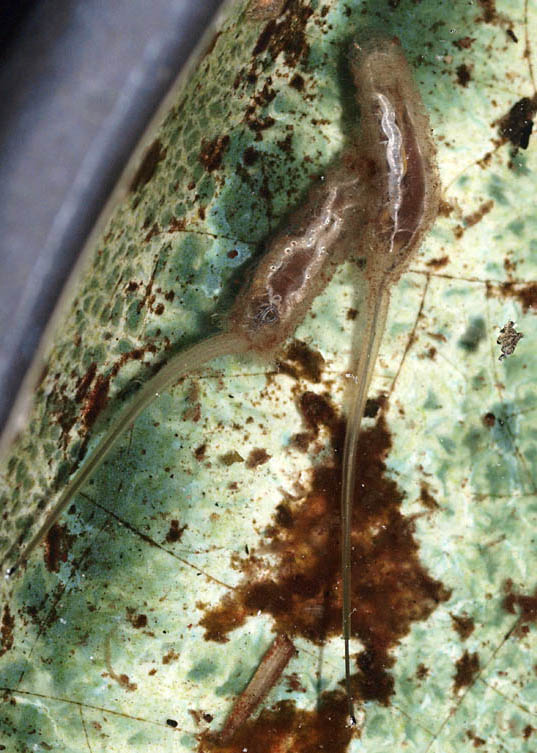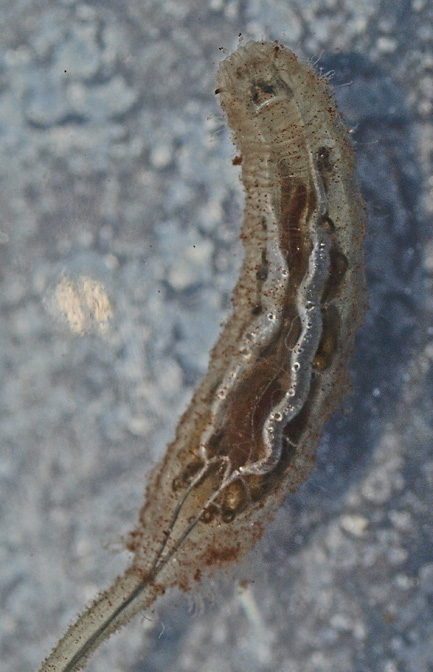Diptera.info :: Family forums :: Syrphidae
Who is here? 1 guest(s)
|
Which Syrphidae rat tail larvae?
|
|
| Line Sabroe |
Posted on 14-01-2014 17:13
|
|
Member Location: Aalborg, North Jutland, Denmark Posts: 61 Joined: 06.10.13 |
Found hiding under decaying leaves in the bird bath in my garden in Aalborg, Denmark on November 24th of 2013. Length without the breathing tube about 10 mm. feeding on some kind of red-brown algae. I've come to the conclusion that they are most likely either Helophilus or Eristalis larvae. Can anyone help with an ID? Line Sabroe attached the following image:  [120.8Kb] Line |
|
|
|
| Line Sabroe |
Posted on 14-01-2014 17:14
|
|
Member Location: Aalborg, North Jutland, Denmark Posts: 61 Joined: 06.10.13 |
A closer look
Line Sabroe attached the following image:  [130.59Kb] Line |
|
|
|
| Line Sabroe |
Posted on 14-01-2014 17:15
|
|
Member Location: Aalborg, North Jutland, Denmark Posts: 61 Joined: 06.10.13 |
From the side
Line Sabroe attached the following image:  [114.72Kb] Line |
|
|
|
| Line Sabroe |
Posted on 14-01-2014 17:16
|
|
Member Location: Aalborg, North Jutland, Denmark Posts: 61 Joined: 06.10.13 |
and belly up
Line Sabroe attached the following image:  [121Kb] Line |
|
|
|
| Ectemnius |
Posted on 14-01-2014 17:47
|
|
Member Location: The Netherlands Posts: 865 Joined: 22.11.11 |
Hello Line Sabroe, I would say, under these circumstances, to think about Myathropa florea. I once found larvae in similar conditions and next spring there emerged some nice Myathropa specimens. Greetings, Ectemnius |
|
|
|
| Line Sabroe |
Posted on 25-01-2014 15:19
|
|
Member Location: Aalborg, North Jutland, Denmark Posts: 61 Joined: 06.10.13 |
Hello Ectemnius Thank you for answering, and I'm sorry I've been so long in responding. I do not think that these are Myathropa florea larvae. I have checked with a key (Danish book Danmarks Svirrefluer by E. Torp) and it states that florea larvae have a much longer breathing tube (about 3 to 4 times the body length) and the front breathing horns should be paler. There is one more possibility besides Helophilus and Eristalis, and that is Sericomyia silentis - although I only spotted a fly of this species on two occasions, whereas there has been plenty of the other two species on the site. This doesn't rule it out, though. In favour of Sericomyia silentis is the size and shape of the front breathing horns, that looks rather short and stumpy. Sadly the quality of the images are not really good enough to clearly show the characters that I need to use the key properly. Best regards Line |
|
|
|
| Jump to Forum: |












